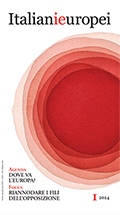The recent wave of Arab revolutions has spurred a healthy debate in academia on how predictable political changes are and whether it is really possible to forecast them (see Marta Dassù and Nassim Nicholas Taleb).
A closely related matter is whether some regimes and regime changes are more comparable than others: is political change in Japan easier to foresee than, say, in Angola? Is it a matter of political systems? Or change is produced by certain factors and in certain countries more than others?
For one thing, 2011 will stay in the World Politics Yearbooks as «the year so many leaders fell»: Ben Ali, Mubarak and Ghaddafi, but also Gbagbo in Ivory Coast and, if you wish, Berlusconi in Italy.
Does it make statistical sense to compare Mubarak and Berlusconi? As awkward the question may sound, it does have some sense, since it leads to additional questions that are useful to ask from a political analysis perspective.
The first one is: are the models comparable? Or is weighing them one against the other like comparing tomatoes and peaches? Of course Italy is a democracy and Berlusconi fell through a parliamentary vote, not by the sacrifice of demonstrators as in the case of Mubarak. Yet, if one looks at the causes of change, there are in fact many similarities: the havoc in Arab regimes has been triggered by worsening economic conditions, bleak prospects for growth and a bulging, unemployed youth. In Italy – bar the “bulging”, yet unemployed, youth –, many similar conditions hold: rising debt costs, real wages depreciation and the erosion of economic growth prospects. If one ventures to compare Berlusconi with Ghaddafi, an additional similarity arises: notwithstanding domestic grievances, both faced huge external pressure, in the form of European Union scrutiny and NATO action, respectively.
Then comes the second question: are the models going to react in a similar way? Of course, this depends on history, culture, society and context. The risk of market punishment could be a convincing push for Italy to embark on difficult reforms, that no elected government was able to pass for the last twenty years. In the Arab world there is no formal, direct international constraint, but the vigilance of the International Monetary Fund and the risks of regional conflict are serious limits to their free maneuvering, or at least increase the costs of trying to do that (hence the “subliminal” messages to Iran that it may be attacked if it continues toying with its nuclear project).
Thirdly: what will be the internal consequences of change? Elections in Tunisia, ongoing turbulence in Egypt, continuous demonstrations in Syria do signal that people need to voice their concerns and that this swelling force has to find an exhaust route to reach a new point of equilibrium. Transition may be long, but it is necessary until the forces that were liberated consolidate into a sustainable balance.
In Italy, in a way, a similar momentum is building: the collapse of the party system, that Berlusconi aided but that he did not force, is creating a void that people and movements may fill, if they so wish. Whatever they say in public, political, social and economic representatives know that their time has come and that the economic tide is going to wash them away, unless the country takes up the courage to make the reforms it needs. The other new point is that people are a bit more conscious about their destiny: never before have topics like “Italian bonds-German Bund spread rates” or the role of the European Central Bank been topics of everyday parlance as today.
Does this mean that, as in Cairo and Tunis, people will go down Rome’s streets chanting “Al shaab iurid” (“The people want...”)? Not likely, but the interplay of global factors and external interventions does take its toll and creates a political void that must be filled, quickly.
It remains to be seen, in Italy, Libya and elsewhere, whether the new rules of the game will properly take into account the lessons of missed opportunities of the past.







